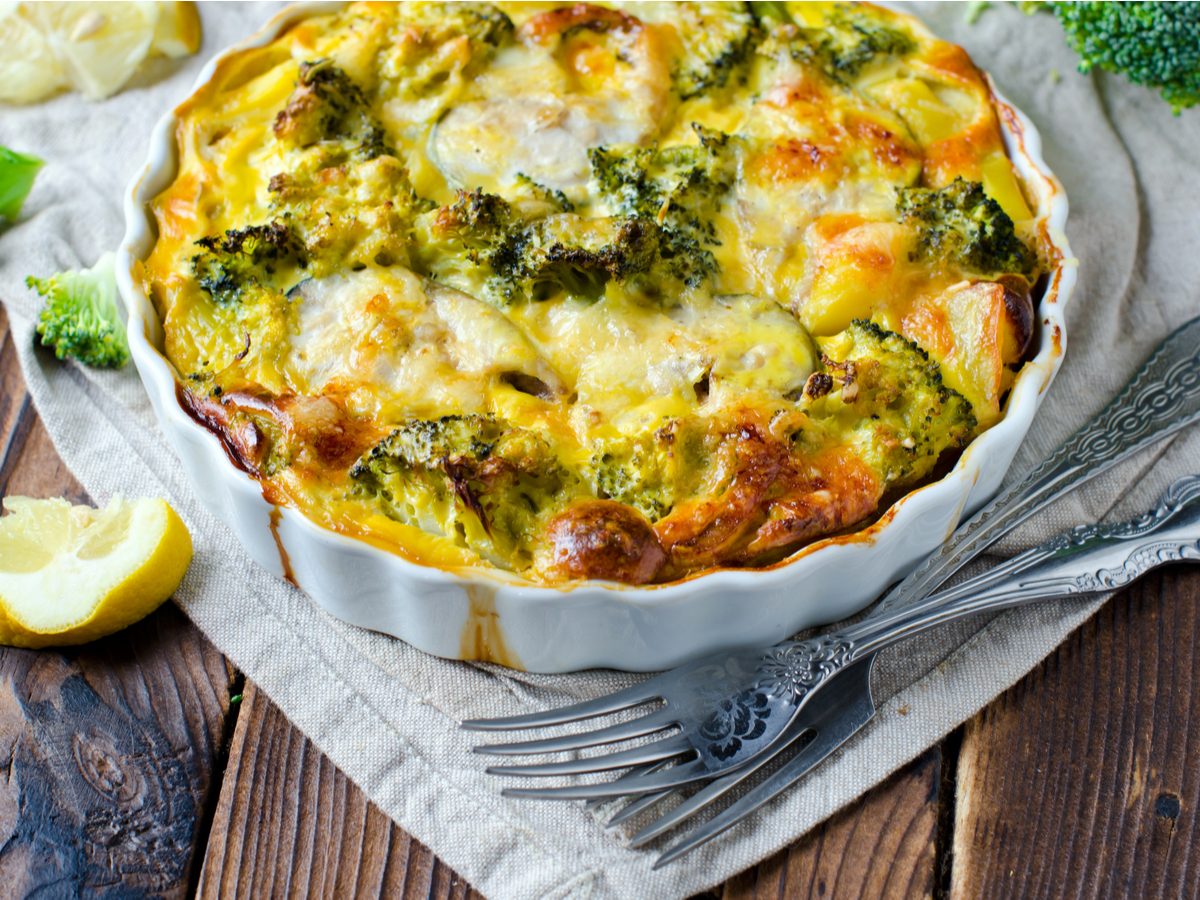How My Mother-in-Law’s Casserole Brought Us Together During Quarantine
Even though she lost her husband of 50 years two months before lockdown, my mother-in-law still delivered dinners and other treats to our family.

Cooking Through Grief
My mother-in-law tells me she’s coming over, so I lock the front door. My four-year old twins stand with their hands and faces pressed against the window. Their excited breath fogs up the glass and they write their names to pass the time. I need to keep them inside—it’s early April and Toronto is in lockdown—but I know they won’t be able to resist hugging their grandmother without being restrained.
“She’s wearing a mask,” I hear one whisper to the other as she gets out of the car.
They’ve never seen such a thing, their Bubby wearing a mask, and they’re unsure, a little afraid. But as she gets closer, they see her holding a large dish in her gloved hands and an old rum Tortuga cake box piled with cookies.
“Is that for us?” the boys ask.
She puts it down on the porch as the boys hold up their drawings for her to see through the door. Her bright eyes are still visible and you just know she’s smiling under her N95.
We are grateful to have dinner brought to us tonight. A crisis really calls for a casserole. And a global pandemic forcing us to isolate at home indefinitely? That calls for Carol’s broccoli cheese casserole, with its layers of melted cheese, mushroom soup and soft vegetables, sprinkled with toasted breadcrumbs. It’s a recipe she learned at a cooking class hosted by her synagogue’s sisterhood 30 years ago.
“But I add an extra layer of cheese,” she tells me.
That’s the kind of person she is—the kind to go rogue with cheese when the situation calls for it. She’s also the kind of person who continues to care for her loved ones while in the middle of deep personal grief.
Only three months before bringing us this casserole, in January, Carol lost her husband of 50 years. Yet, each week she offers meatballs, chicken soup or blueberry muffins—still warm from her oven—inside of yogurt containers she sets aside for such deliveries.
“I Talk to Him While I Cook”
Carol and my father-in-law, Ron, were set up on a blind date in December 1966 while she was still in high school and he was studying engineering at the University of Toronto. Two and a half years later, they married and eventually had four kids. Even later in life, when I met them, their partnership was filled with the joyful energy of a good hora and the soulfulness of a mezinke—the dance performed at Ashkenazi weddings when a youngest child is married off. It was done at my wedding to their fourth, and last, child. I still vividly remember seeing Ron and Carol on the dance floor wearing floral crowns and big smiles, encircled by friends and family clapping and singing and celebrating them.
When Ron died, Carol took great comfort in the Jewish tradition of shiva, a week-long period of mourning where people visit the family home of the deceased. She’s always been a social person, collecting people like the dozen dreidels displayed in the glass case in her dining room. But when COVID-19 struck, no one could be there by her side any longer.
Carol feels Ron’s absence every day in their apartment. At meals, his seat at the table is empty. He’s not on the balcony to share a cup of coffee as she watches the city go by. And he’s not on the couch next to her at night to watch a show on television. But, she tells me, since she made all their meals for them when he was alive, she still feels connected to him when she cooks. And so, she cooks.
“I talk to him while I cook,” she says. “I’m making kugel now and I’ll say ‘Ronnie you loved this kugel. You loved putting sour cream on this kugel. Too much sour cream. I’m sorry you won’t be here to eat it.’”
The Love Goes On
I find myself thinking about Carol alone in her kitchen, preparing food. I think about all the steps that go into making the casserole. I imagine her standing over the counter, grating the cheese, and then the extra cheese, opening the soup cans, washing the broccoli and cauliflower, chopping them into florets, dividing them into four separate dishes for the families of her four children.
“Do you steam the veggies first?” I asked her at one drop off, although what I was really asking was: How are you doing this? How are you grieving in such uncertain times without even the comfort of being surrounded by the people who love you?
“Yes,” she says. “Just enough to make them soft.”
Then she tells me she’ll be dropping a kugel off later in the week. My boys will savour the sweet forkfuls of pasta and ricotta. I will too, even though I’m lactose intolerant, because the constancy of her deliveries eases the stress and anxiety of trying to raise toddlers during a pandemic.
From Carol I’ve learned that grief is love and love is food and none of that stops just because we are all separated, by quarantine or more. We still eat, and we still love and we still mourn.
This is what I want to tell my boys when they ask where their Zaidy has gone and why is Bubby standing so far away. Instead, I give them blueberry muffins. And as they peel off the heart paper wrappers, I tell them, “Bubby made those specially for you.”
Next, read about how one woman tried to be a good neighbour during COVID-19.



